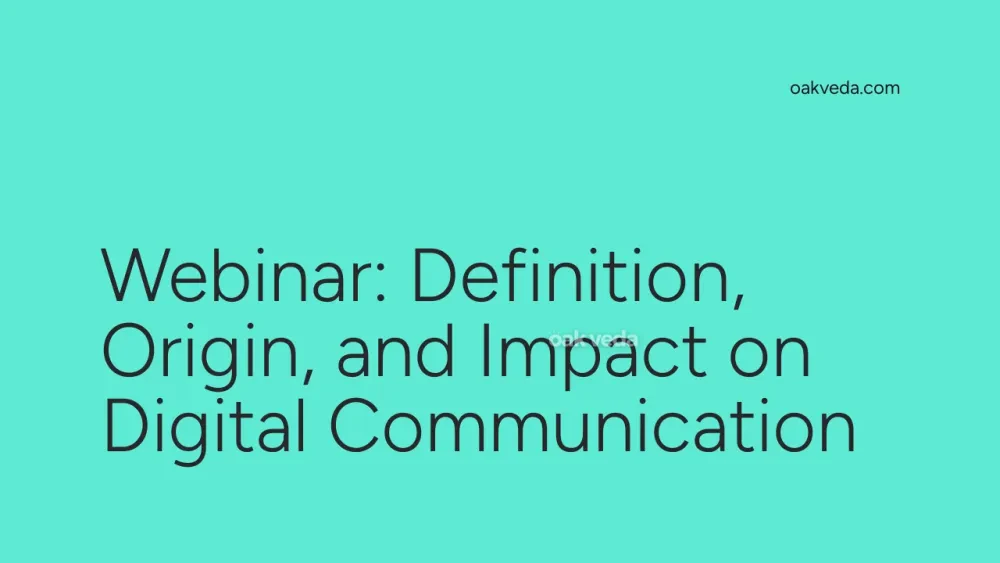
What is a Webinar?
A webinar, short for "web-based seminar," is an interactive online event that combines audio and visual elements to deliver presentations, workshops, or seminars to a remote audience. Webinars have revolutionized the way businesses, educators, and thought leaders share information and engage with their audience in real-time, regardless of geographical boundaries.
Origin and Development of Webinars
The concept of webinars emerged in the late 1990s as internet technologies advanced. The term "webinar" was coined in 1998 by Eric R. Korb, who combined "web" and "seminar" to describe this new form of online communication. Since then, webinars have evolved significantly, benefiting from improvements in internet speeds, video streaming technologies, and interactive features.
How Webinars Work
Webinars typically utilize specialized platforms that facilitate seamless communication between presenters and participants. Here's a breakdown of the process:
- Planning: Organizers choose a topic, set a date and time, and select a webinar platform.
- Registration: Attendees sign up through a registration page, often providing their email address and other relevant information.
- Preparation: Presenters create their content, usually in the form of slides, videos, or demonstrations.
- Delivery: At the scheduled time, presenters host the live session, sharing their screen and engaging with participants.
- Interaction: Attendees can ask questions, participate in polls, and engage in discussions via chat features.
- Follow-up: After the webinar, organizers often send recordings, additional resources, or surveys to participants.
Types of Webinars
Webinars come in various formats to suit different purposes:
- Live Webinars: Real-time events where presenters interact directly with the audience.
- On-Demand Webinars: Pre-recorded sessions that participants can access at their convenience.
- Hybrid Webinars: Combine live and pre-recorded elements for a flexible presentation format.
- Series Webinars: A sequence of related webinars delivered over time, often used for in-depth training or courses.
- Panel Webinars: Feature multiple experts discussing a topic, often with a moderator.
Popular Examples of Webinars
Webinars have been widely adopted across various industries:
- TED Talks: While not exclusively webinars, TED's online platform showcases the power of digital knowledge sharing.
- HubSpot Academy: Offers marketing and sales webinars that have become industry standards.
- Coursera Live Sessions: Enhances online courses with interactive webinar components.
- Adobe Creative Cloud Tutorials: Provides software training through live and recorded webinars.
Impact of Webinars on Digital Communication
Webinars have significantly influenced how we communicate and learn online:
- Democratized Knowledge Sharing: Experts can reach global audiences without geographical constraints.
- Enhanced Remote Learning: Educational institutions leverage webinars for distance learning programs.
- Improved Business Communication: Companies use webinars for product launches, training, and customer engagement.
- Cost-Effective Marketing: Webinars serve as powerful lead generation and nurturing tools.
- Facilitated Networking: Virtual events and conferences use webinar technology to connect professionals worldwide.
Controversies or Debates Surrounding Webinars
While widely adopted, webinars are not without challenges:
- Zoom Fatigue: The increased reliance on video conferencing has led to digital exhaustion for many.
- Privacy Concerns: Data collection and security issues have been raised regarding some webinar platforms.
- Engagement Challenges: Maintaining audience attention in a virtual environment can be difficult.
- Technical Barriers: Internet connectivity issues can disrupt the webinar experience.
How Brands and Influencers Use Webinars
Businesses and thought leaders leverage webinars in various ways:
- Lead Generation: Offering valuable content in exchange for contact information.
- Product Demonstrations: Showcasing features and benefits to potential customers.
- Thought Leadership: Establishing authority in a particular field through educational webinars.
- Customer Onboarding: Providing training and support to new clients.
- Internal Communication: Conducting company-wide meetings and training sessions.
Future Trends Related to Webinars
The webinar landscape continues to evolve:
- AI-Powered Personalization: Tailoring content and recommendations based on attendee data.
- Virtual and Augmented Reality Integration: Creating more immersive webinar experiences.
- Micro-Webinars: Short, focused sessions designed for mobile consumption.
- Increased Interactivity: Incorporating gamification and collaborative tools to boost engagement.
- Multilingual Capabilities: Real-time translation features to reach global audiences more effectively.
FAQs about Webinars
-
How long should a webinar be? Typically, 45-60 minutes is ideal, including time for Q&A.
-
What equipment do I need to host a webinar? A computer with a reliable internet connection, a good quality microphone, and a webcam (optional but recommended).
-
Are webinars effective for marketing? Yes, webinars can be highly effective for lead generation, nurturing, and establishing thought leadership.
-
How do I make my webinar engaging? Use interactive elements like polls, Q&A sessions, and breakout rooms. Keep content visually appealing and encourage participation.
-
What's the difference between a webinar and a web conference? Webinars are typically one-to-many presentations, while web conferences are more collaborative and interactive meetings among peers.
In conclusion, webinars have become an integral part of digital communication, offering a versatile platform for education, marketing, and collaboration. As technology continues to advance, we can expect webinars to evolve, providing even more immersive and engaging experiences for participants worldwide.
You may be interested in:
- Link-in-Bio: Definition, Origin, and Impact on Social Media
- Verified: Definition, Origin, and Impact on Social Media
- Follow Friday: Definition, Origin, and Impact on Social Media
- Double-Tap: Definition, Origin, and Impact on Social Media
- Gatekeeping: Definition, Origin, and Impact on Social Media
- RN: Definition, Origin, and Impact on Social Media

